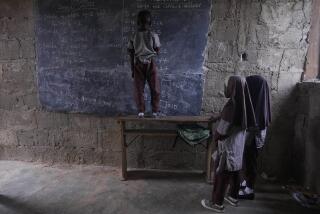Power by the Foot: Africans Pedal for Electricity
- Share via
MUSHERI CENTER, Rwanda — In this remote village of dirt-floor homes, recharging a cellphone has long meant bicycling 25 miles to the nearest town with power, or 4 miles to the closest charged-up car battery.
So the excitement was palpable when aid workers showed up recently with the first test model of what may prove to be an energy revolution for Africa: the Freecharge Weza, a foot-pedal power generator.
Originally created to give an emergency kick-start to stalled boat engines, the sleek little South African-designed machine, pumped with one foot, can charge a cellphone battery in five minutes or a car battery in half an hour. The device’s creators, who plan to distribute it across swaths of Africa far from the power grid, hope it will jump-start development efforts as effectively as it does dead cellphones.
Residents of Musheri Center, fit but fatigued from bicycling long hours for power, saw the machine’s advantages right away as it charged not only a batch of cellphones but also the car battery that runs the village hair salon’s stereo and electric hair clippers.
“I was using two legs. Now I can use only one!” enthused Frank Rwagafirita, 35, a community leader, as he stomped on the machine’s foot pedal while perched on a tilting chair. “It’s more relaxing.”
Rwanda, like most African nations, has a serious shortage of power. Less than 5% of the country’s 8.4 million people have access to electricity, and even in Kigali, the capital, outages are a regular problem.
To power their radios, stereos and cellphones -- now ubiquitous in Africa -- most people turn to car batteries. But even those need regular recharging, necessitating long trips to the nearest electrical outlet.
“You often find people walking from village to village with a car battery perched on their head, going to get it recharged,” said Technology Director John Hutchinson, a South African engineer who helped create the Weza for Freeplay Energy Plc.
The Weza, which means power in Swahili, is designed to eliminate that waste of time and human energy and provide power wherever it’s needed for whatever people would like to do -- run an electric sewing machine, charge an electric fence, power emergency medical equipment or light a home at night so children can study or midwives can help in a delivery.
“When people see the Weza in action they begin to brainstorm about what they could do,” said Midi Berry, a senior development consultant for the Freeplay Foundation, a nonprofit group established by the company for humanitarian work. The foundation started out distributing wind-up radios across Africa and now hopes to use the Weza to spur economic development.
At dusty Musheri Center, a women’s cooperative that owns a cellphone and sells calls to villagers plans to acquire a Weza, using a micro-credit loan provided through CARE, and charge community members a small fee to recharge their cellphones and car batteries.
“Many, many people are enthusiastic about this,” said Innocent Rutikanga, a Rwandan CARE official who works on economic security programs for the charity. More than 1,200 small cooperatives in Rwanda are interested in the machine, he said, and when the first commercial lot of the devices is shipped to Africa, starting in September, “we will request many Weza.”
The portable device, which sells in the United States for about $270, is the result of brainstorming on ways to create larger amounts of power than the hand-crank flashlights, radios and mobile phone chargers the Freeplay company sells.
“When you hand-crank something you’re restricted to the energy capability of your fingers and hands. The larger muscles of your legs are obviously the way to extract more energy,” Hutchinson said. After experimenting with bicycle-powered generators and a kind of seesaw, engineers at the company eventually settled on a simple foot-pedal machine with an internal, rechargeable battery, designed for rough use in remote areas.
“In the First World, there’s an aversion to using human energy. People say, ‘I have to wind this thing for five minutes?’ But in Africa, people say, ‘I’ve got free power!’ ” Hutchinson said.
The Freeplay Foundation aims to deliver the first 50 Wezas -- funded by the World Bank -- to Rwanda later this yearand will hold a two-day training course in how they might be used in economic development efforts. Development projects in Zambia, Tanzania, Sierra Leone and Angola also plan to begin using the machine, Berry and Hutchinson said.
In Musheri Center, residents say they hope the day will come when there’s a Weza in every home.
“I’m really happy with it,” said Jean de la Croix Habiyambene, 40, a sorghum and corn farmer, as he stomped on the device’s pedal, creating a whirring noise a bit like an electronic frog chirp. “I wish I had one. If I was given one, I could get rich.”
More to Read
Sign up for Essential California
The most important California stories and recommendations in your inbox every morning.
You may occasionally receive promotional content from the Los Angeles Times.












